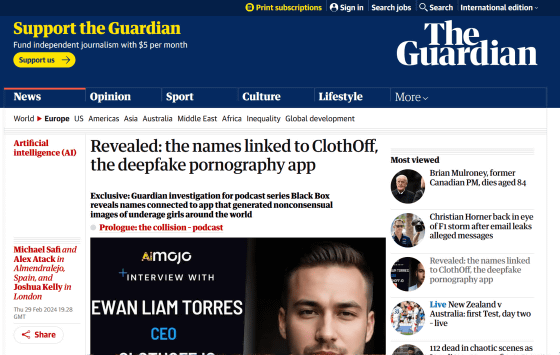Who is behind the AI porn app 'ClothOff' that strips clothes from photos of girls being sexually assaulted?

With the development of AI, 'AI pornography apps' that strip photos of real women have
Revealed: the names linked to ClothOff, the deepfake pornography app | Artificial intelligence (AI) | The Guardian
https://www.theguardian.com/technology/2024/feb/29/clothoff-deepfake-ai-pornography-app-names-linked-revealed

Miriam Al-Adib, who lives in the town of Almendralejo in southern Spain, was shown a 'deepfake nude image of herself' by her 14-year-old daughter. 'I was shocked when I saw it. The image was so real... If I didn't know my daughter's body, I would have thought it was real,' she said, expressing concern that the image could be reposted on pornographic sites.
The image was one of dozens of nude images generated by an AI pornography app targeting female students in Almendralejo, and was spread over several weeks in WhatsApp groups created by other students. Some of the girls whose deepfake nude images were spread have refused to go to school, suffered panic attacks, been blackmailed, or been bullied. Prosecutors are also considering prosecuting children who generated and downloaded deepfake porn.
In another case, far away from Spain, in the US state of New Jersey, male students were found to have used an AI pornography app to generate and share nude images of female students. In both the Spanish and US cases, the same AI pornography app, called 'ClothOff,' was used.
Police launch investigation into AI-generated fake nude photos of female classmates shared by male high school students in group chats - GIGAZINE

ClothOff claims that 'anyone can use AI to remove the clothes of people in photos,' and users who self-identify as over 18 can use credits earned through a payment to generate deep fake nude images via their smartphone.
For about a year after the app was released, the ClothOff operators maintained their anonymity, even altering their voices when answering phone interviews with the media. They even used AI to generate a photo of a person claiming to be the CEO. The photo below shows the face of the fictitious CEO, which is believed to have been generated by AI.

While details about who was behind ClothOff remained unclear for a long time, The Guardian claims to have conducted a detailed investigation into ClothOff's stakeholders over the course of six months and identified people believed to be involved with the app.
ClothOff's trail leads to Belarus and Russia, but first passes through front companies based in Europe and the UK. Screenshots reviewed by The Guardian reveal a Telegram account under the name of Dasha Babicheva, a
Additionally, investigation of social media accounts identified a 30-year-old named Alexander Babicheva as Dasha's brother. ClothOff directed job applicants to an email address for a website called 'AI-Imagecraft,' which is a copy of a website of the same name owned by Alexander, called 'A-Imagecraft.' The Telegram account used to contact business partners as ClothOff's founder was named 'Al,' a nickname associated with Alexander.
Furthermore, photos posted by Alexander and Al on their Telegram accounts show that they were both staying at the same hotel in Macau on January 24th and in the same room at the same hotel in Hong Kong on January 26th. This suggests that Alexander and Al are at least close enough to travel together, or that they are the same person.
However, in response to inquiries from The Guardian, Alexander denied any connection to ClothOff, claimed he does not have a sister named Dasha, and denied that the Telegram account listing his phone number was his. He did not respond to further inquiries.

According to The Guardian, ClothOff used a London-registered company called Texture Oasis to disguise the transfer of funds. Texture Oasis claims to sell products for architectural and industrial design projects, but the text on its website was copied from another legitimate company, and employees listed as Texture Oasis said they had no knowledge of Texture Oasis. The Guardian's investigation also found no connection between the people listed as Texture Oasis employees and ClothOff, suggesting they simply copied the names from random sources.
The Guardian also found numerous pieces of evidence linking ClothOff to GGSel, including a LinkedIn account under Alexander's name that listed him as an employee of GGSel, an online gaming marketplace that helps Russian gamers evade Western sanctions. The Guardian also found evidence of a connection between ClothOff and GGSel, including the upload of ClothOff's website code to the GitHub account of a person named Alexander German who claimed to be a GGSel employee.
After The Guardian began inquiring about GGSel's relationship with ClothOff, several LinkedIn accounts listed as working for GGSel removed references to GGSel or changed their names.
ClothOff told The Guardian that it has no affiliation with GGSel or anyone named in the article, and that its app does not 'process' images of people under the age of 18. However, it did not clarify how the images in the Spanish case were generated.

Related Posts:
in Free Member, Education, Web Service, Posted by log1h_ik







